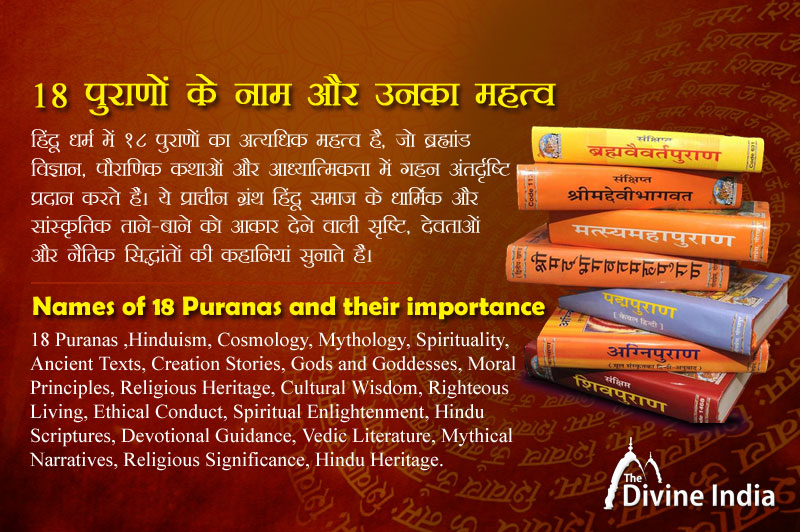Names of 18 Puranas and their importance
thedivineindia.com | Updated UTC time: 2024-01-28 22:23:19
The 18 Puranas hold immense significance in Hinduism, providing profound insights into cosmology, mythology, and spirituality. These ancient texts narrate tales of creation, gods, and moral principles, shaping the religious and cultural fabric of Hindu society. They guide devotees on righteous living, ethical conduct, and the pursuit of spiritual enlightenment.
Brahma Purana
- Also known as "Adi Purana," referenced in all ancient Puranas.
- Unique with approximately 10,000 to 13,787 verses.
- Narrated by Sage Lomaharshana at Naimisharanya.
- Encompasses creation, origin of Manu's lineage, and the emergence of deities and beings.
- Expansive descriptions of various pilgrimage sites.
- Comprises 245 chapters, with a supplementary Saura Upapurana.
Padma Purana:
- Contains 641 chapters and 48,000 verses.
- Varies in verse count according to Matsya and Brahma Puranas.
- Divided into sections like Creation, Earth, Heaven, Hell, and the Northern section.
- Narrated by Suta Ugrashrava at Naimisharanya.
- Explores diverse topics, emphasizing aspects of devotion to Lord Vishnu.
- Developed around the 5th century.
Vishnu Purana:
- Reflects the essence of Puranas through five characteristics.
- Comprises six sections with 126 chapters and 23,000-24,000 verses.
- Narrated by Sage Parashara and listener Maitreya.
- Vishnu highlighted as the supreme deity.
- Explores cosmology, genealogies, and the importance of righteous living.
Vayu Purana:
- Often referred to as Shiv Purana due to its emphasis on Lord Shiva.
- Contains 112 chapters and 11,000 verses.
- Prominent in the Magadh region, featuring the Gaya Mahatmya.
- Divided into four parts: Prakriyapada, Upodghat, Anushangapada, and Upasamhara.
- Explores creation, geography, astrology, and Shiva devotion.
Bhagavata Purana:
- Widely popular, known for the life of Lord Krishna.
- Consists of 12 cantos, 335 chapters, and 18,000 verses.
- Revered as a comprehensive spiritual guide, highlighting devotion to Lord Krishna.
- Some consider it as Devi Bhagavata Purana, emphasizing the divine feminine.
- Estimated to be composed in the 6th century.
Narada (Brihannaradiya) Purana:
- Referred to as Mahapurana, lacking five traditional characteristics.
- Divided into two parts: Purvakhanda (125 chapters) and Uttarakhanda (82 chapters).
- Explores topics like salvation, dharma, astrology, and various sciences.
- Covers a wide range, from creation to Vedic branches and music to Shiva devotion.
Markandeya Purana:
- Considered one of the oldest Puranas.
- Narrated by Sage Markandeya to Kraustuki.
- Comprises 138 chapters and 7,000 verses.
- Discusses household duties, rituals, astronomy, and the glory of Durga.
- Encompasses diverse topics such as Yoga, Durga Mahatmya, and the narrative of King Harishchandra.
Agni Purana:
- Named after Agni, featuring Vishnu's incarnations.
- Contains 383 chapters and 11,500 verses.
- Serves as a vast repository of Indian culture and knowledge.
- Explores topics ranging from geography and astronomy to Ayurveda and music.
- Notable for its coverage of diverse subjects.
Bhavishya Purana:
- Foretells future events.
- Comprises two parts: PurvArda (41 chapters) and UttArda (171 chapters).
- Encompasses Brahma, Vishnu, Shiva, Surya, and Pratisarga Parva.
- Major focus on Brahman-Dharma, rituals, and Varnashrama-Dharma.
- Estimated composition between 500 CE and 1200 CE.
Brahmavaivarta Purana:
- Devoted to Lord Krishna's life.
- Consists of 18,000 verses in four sections: Brahma, Prakriti, Ganesha, and Shri Krishna Janma.
- Emphasizes devotion to Lord Krishna.
Linga Purana:
- Focuses on Shiva worship.
- Encompasses 11,000 verses across 163 chapters.
- Highlights 28 avatars of Lord Shiva.
- Divided into Purva Bhaga and Uttara Bhaga.
- Addresses diverse subjects like creation, rituals, and cosmology.
Varaha Purana:
- Describes Vishnu's Varaha (boar) incarnation.
- Contains 24,000 verses.
- Limited availability, with sections covering diverse topics.
Skanda Purana:
- Largest among the Puranas.
- Encompasses 81,000 verses in seven Samhitas: Maheshvara, Vishnu, Brahma, Kashi, Avanti, Nagara, and Prabhasa.
- Covers cosmology, astronomy, festivals, and narratives associated with different deities.
- Divided into Khandas and Mahatmyas.
Kurma Purana:
- Devoted to Lord Vishnu's Kurma (tortoise) incarnation.
- Contains 17,000 verses.
- Emphasizes the significance of pilgrimage sites and associated legends.
Matsya Purana:
- Features the story of the Matsya (fish) incarnation of Lord Vishnu.
- Contains 14,000 verses.
- Comprises sections on cosmology, mythology, and dharma.
Garuda Purana:
- Narrated by Lord Vishnu to Garuda, the divine eagle.
- Contains 19,000 verses.
- Emphasizes the importance of ethics, dharma, and rituals.
- Describes the journey of the soul after death.
Brahmandapuran:
- It has 109 chapters and 12,000 verses.
- It has four parts – (a) Process, (b) Anushang, (c) Upodghata and (d) Epilogue.
- It is believed to have been composed between 400 AD and 600 AD.
Shiva Purana:
- Dedicated to Lord Shiva.
- Contains 24,000 verses.
- Divided into six Samhitas: Vidyesvara, Rudra, Shatarudra, Kotirudra, Uma, and Kailasa.
Agneya Purana:
- Associated with Agni and fire rituals.
- Limited information available.
Narasimha Purana:
- Devoted to Lord Vishnu's Narasimha (man-lion) incarnation.
- Contains 8,000 verses.
- Focuses on the glory of Narasimha and his various forms.
Padma Purana:
- A significant Purana with diverse narratives.
- Comprises 55,000 verses.
- Divided into five sections: Srishti, Bhumi, Svarga, Brahma, and Uttara Khanda.
Conclusion: The Puranas form a rich tapestry of ancient Indian wisdom, encompassing diverse topics such as cosmology, mythology, theology, rituals, and moral teachings. These texts provide valuable insights into the cultural, spiritual, and philosophical heritage of India, offering guidance on righteous living and the pursuit of higher knowledge. Each Purana, with its unique emphasis and narrative style, contributes to the holistic understanding of the intricate tapestry of Hindu thought and tradition.


